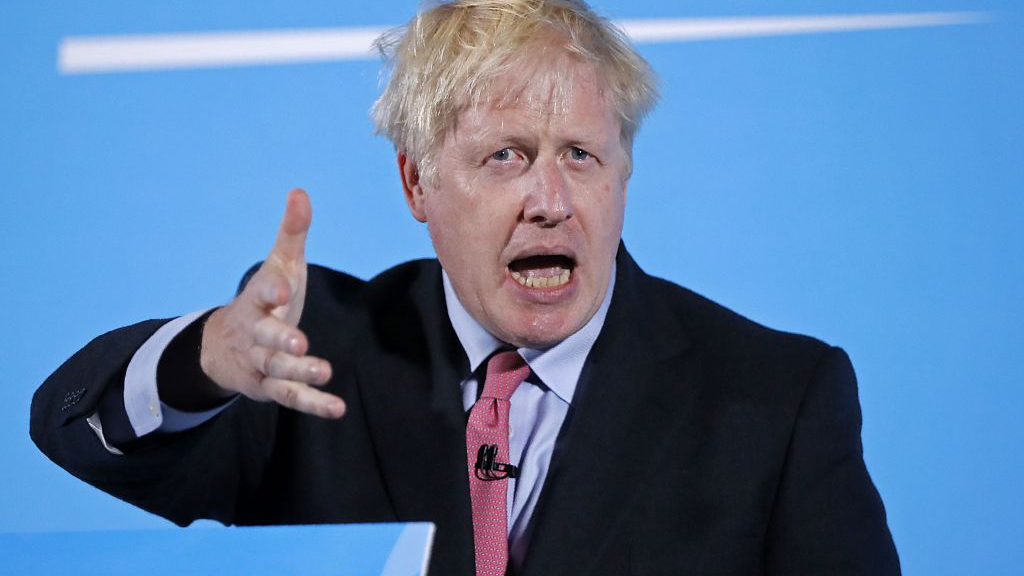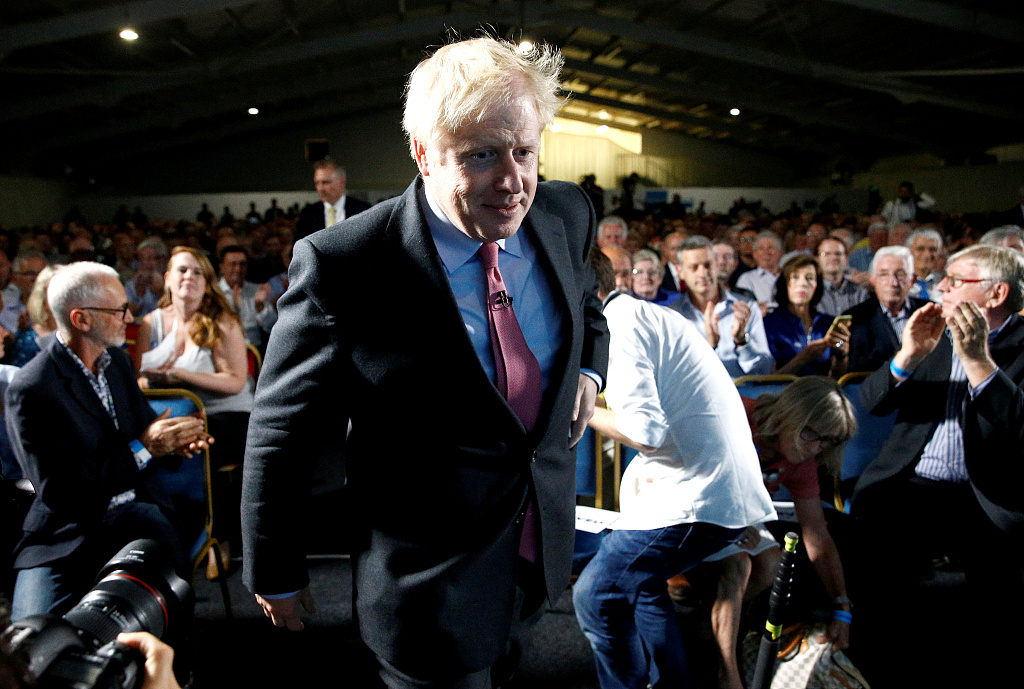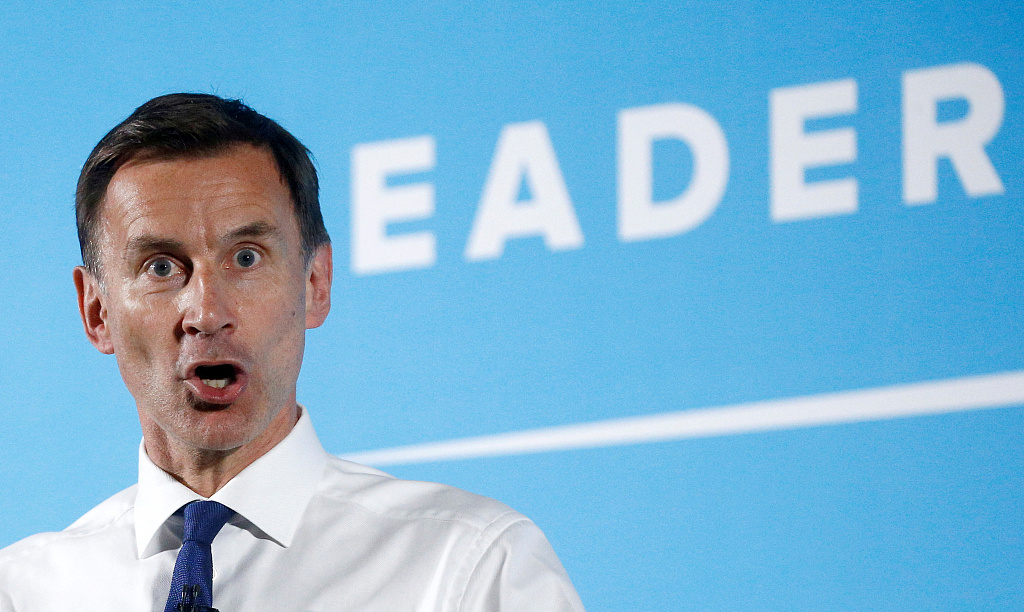

Editor's note: Chris Deacon is a postgraduate researcher in politics and international relations at the University of London and previously worked as an international commercial lawyer. The article reflects the author's opinions, and not necessarily the views of CGTN.
The likely next prime minister of the United Kingdom, Boris Johnson, has made a point of repeatedly promising during his leadership campaign that, whatever happens — in Johnson's words, "do or die" — the UK will leave the European Union on October 31. Should we take him at his word?
This question largely revolves around the extent to which Johnson is genuinely prepared to take the UK out of the EU without a deal. The EU is insistent that the current deal on the table — negotiated by departing prime minister Theresa May — is the only deal available and will not be renegotiated. However, Johnson has specific objections, principally relating to the Northern Ireland "backstop," which he aims to renegotiate.
But the EU is adamant that this is impossible. While it would be open to changes to the agreed framework of the "future relationship" between the bloc and the UK, the substance of the withdrawal agreement document cannot change.
The backstop, in particular, has been described as non-negotiable as it protects the fundamentals of the EU's Single Market, while also respecting the Good Friday Agreement's guarantee of no "hard border" on the island of Ireland.

Boris Johnson, a leadership candidate for Britain's Conservative Party, attends a hustings event in Maidstone, Britain, July 11, 2019. /VCG Photo
It appears likely, therefore, that — unless Johnson backtracks on his opposition to May's deal (and even if he does, there does not appear to be a majority of Members of Parliament who will vote for it) — the only way to guarantee leaving the EU on October 31 is to leave without a deal.
Despite this reality, Johnson has continually claimed throughout the Conservative leadership contest that the chances of a no-deal Brexit are "a million to one."
This failure to admit the reality of the situation is as deluded as it is concerning. To start with, not being honest with the public about the likelihood of leaving without a deal dangerously undermines the message that preparations for such an eventuality must be undertaken.
If Johnson is serious about leaving on October 31 no matter what, his first priority as prime minister must be to ensure that the country is as prepared as possible for this.
His failure to encourage companies and other organisations around the country to undertake such preparations betrays either a willful ignorance regarding the severity of the potential consequences of no-deal, or the fact that he is simply bluffing and does not plan on actually following through with such an outcome.
Johnson has only one core purpose at this time: to be elected as leader of the Conservative Party. This means that, for the time being, there is only one very narrow "selectorate" of Tory members that he needs to impress — and they are overwhelmingly pro-Brexit and in favor of leaving the EU no matter the costs of no-deal.
Polling has even shown — quite shockingly — that 54 percent of Tory members would leave the EU even if it meant the end of their party, and 63 percent would leave even if it meant Scotland becoming independent from the rest of the UK.
Considering that the full name of the party is the Conservative and Unionist Party, this latter statistic betrays an obsessive desire to leave the EU even if it causes immense damage to something theoretically dear to the party. No-deal is nothing to be worried about for these people, and Johnson knows it.

Jeremy Hunt, a leadership candidate for Britain's Conservative Party, speaks during a hustings event in Maidstone, Britain, July 11, 2019. /VCG Photo
This evolution of thought has been quite a journey. If one looks back at coverage from the EU referendum campaign, even the staunchest of Brexit supporters often declared their ambition to have a close, Norway-style relationship with the EU.
This would now be unthinkable for them, declaring loudly that even May's deal (a harder Brexit than the Norway model, for certain) is not a "true Brexit." No-deal has rapidly become akin to a religious mission for them.
Johnson will also be acutely aware that, even once he becomes prime minister (assuming no shock defeat by Jeremy Hunt), it is the votes of these hard Brexit supporters that he will rely upon to keep the Conservative Party in power. The existence, and huge success at May's European elections, of the Brexit Party ensures this disturbing truth continues to hover above Johnson's head.
There are, of course, hurdles ahead. A majority in the House of Commons will try every trick they can muster to stop a no-deal outcome. Johnson himself, in his heart of hearts, surely also knows it would be a mistake. But politics is ultimately a selfish game and, if he can avoid Parliament's protests and the EU does not succumb to a renegotiation, Johnson may well feel he has no choice but to go along with his promises. The UK continues to lurch onwards towards leaving the EU without a deal.
(If you want to contribute and have specific expertise, please contact us at opinions@cgtn.com.)

Copyright © 2018 CGTN. Beijing ICP prepared NO.16065310-3
Copyright © 2018 CGTN. Beijing ICP prepared NO.16065310-3